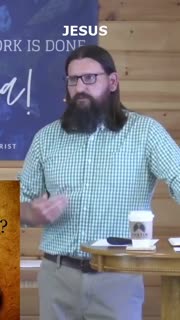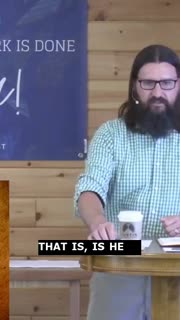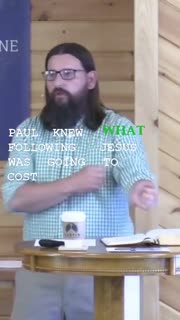Counting the Cost: Paul's Journey and Discipleship
Devotional
Sermon Summary
Bible Study Guide
Sermon Clips
### Quotes for Outreach
1. "Following Jesus Christ is going to cost you, period. Regardless if you're Paul thousands of years ago, or you're a Christian here in the States today, following Jesus is going to cost you one way or the other. Honestly, if it doesn't cost you, you're probably not really following Jesus. Sounds a bit harsh, I know. But following Jesus is going to cost you." [28:40] (25 seconds)
2. "Have you counted the cost? Have you counted the cost of what it's going to cost you to follow Christ? And I think for us, I'll be honest with you, I think culturally for us, that's difficult to ponder. Because we don't really have to pay it. I mean, we're not worried about persecution for the most part. You know, we have protections from the government. We have freedoms from the government. They protect us to be able to gather, and they don't interfere, and all those things." [29:02] (26 seconds)
3. "There is a reason when Jesus was talking to his followers, he said, you must take up your cross daily and follow me. Now, when you're telling this to a bunch of Jews occupied by the Romans who really like to use the cross, that had a heck of a lot more meaning to them than it probably does to us, even though we know what the cross is." [29:40] (21 seconds)
4. "Is he worth the cost? Now, I'm not asking, is he worthy? Because he is worthy. That's decided. That is a universal fact that Jesus Christ is worthy of anything it would cost to follow him. This is a personal question for you. In your life, is he worth the cost? That's a decision we all have to make ourselves." [30:50] (28 seconds)
5. "Jesus is alive. Hell is real. The harvest is vast. The workers are few. The Church, do we feel that? Do we know that hell is real? Do we know that people that we know are going to go to hell because they don't know who Jesus Christ is? And is he worth the risk of telling them about who Jesus is and it might make them mad? I think it is. I think someone's eternal destination is worth it." [31:53] (39 seconds)
### Quotes for Members
1. "Paul knew what following Jesus was going to cost him. He knew that it would cost him his life. And he followed anyway. What about you? Have you counted the cost? Have you counted the cost of what it's going to cost you to follow Christ?" [28:40] (20 seconds)
2. "I think this passage, there's some very, vague-ness in there that we don't, you know, we don't know the stone cold facts about everything in here. We don't know who all was there at the temple that day. We don't know who all the people were. And we're going to get into that a little bit. Like I said, we're just going to go through here and see what Paul has going on." [03:44] (18 seconds)
3. "Paul just agrees to it, and he does it. Which should fix the problem, right? Paul's going to go, and he's going to take this Nazarite vow. He's going to present himself to the priests. He's going to prove that he's not forsaking the law of Moses, that he's not telling people not to have their children circumcised. He hasn't went apostate, basically, is what they're saying." [16:11] (25 seconds)
4. "So here we have Paul coming to Jerusalem, knowing what was going to happen. This was not a surprise, right? I mean, he was told this by the Spirit. He said, constrained by the Spirit to go to Jerusalem, and the Spirit had told him that persecution and imprisonment awaited him. Other believers told him, as we talked about last week, through the Spirit, not to go to Jerusalem because of what was going to happen." [27:18] (24 seconds)
5. "So is he worth it? Is he worth those little mundane things that really in the greater scheme of things don't add up? Which sounds like a stupid question, but I want you to just think for a minute how often we compromise on stupid, mundane things that don't really matter." [36:15] (21 seconds)
Ask a question about this sermon
1. "Following Jesus Christ is going to cost you, period. Regardless if you're Paul thousands of years ago, or you're a Christian here in the States today, following Jesus is going to cost you one way or the other. Honestly, if it doesn't cost you, you're probably not really following Jesus. Sounds a bit harsh, I know. But following Jesus is going to cost you." [28:40] (25 seconds)
2. "Have you counted the cost? Have you counted the cost of what it's going to cost you to follow Christ? And I think for us, I'll be honest with you, I think culturally for us, that's difficult to ponder. Because we don't really have to pay it. I mean, we're not worried about persecution for the most part. You know, we have protections from the government. We have freedoms from the government. They protect us to be able to gather, and they don't interfere, and all those things." [29:02] (26 seconds)
3. "There is a reason when Jesus was talking to his followers, he said, you must take up your cross daily and follow me. Now, when you're telling this to a bunch of Jews occupied by the Romans who really like to use the cross, that had a heck of a lot more meaning to them than it probably does to us, even though we know what the cross is." [29:40] (21 seconds)
4. "Is he worth the cost? Now, I'm not asking, is he worthy? Because he is worthy. That's decided. That is a universal fact that Jesus Christ is worthy of anything it would cost to follow him. This is a personal question for you. In your life, is he worth the cost? That's a decision we all have to make ourselves." [30:50] (28 seconds)
5. "Jesus is alive. Hell is real. The harvest is vast. The workers are few. The Church, do we feel that? Do we know that hell is real? Do we know that people that we know are going to go to hell because they don't know who Jesus Christ is? And is he worth the risk of telling them about who Jesus is and it might make them mad? I think it is. I think someone's eternal destination is worth it." [31:53] (39 seconds)
### Quotes for Members
1. "Paul knew what following Jesus was going to cost him. He knew that it would cost him his life. And he followed anyway. What about you? Have you counted the cost? Have you counted the cost of what it's going to cost you to follow Christ?" [28:40] (20 seconds)
2. "I think this passage, there's some very, vague-ness in there that we don't, you know, we don't know the stone cold facts about everything in here. We don't know who all was there at the temple that day. We don't know who all the people were. And we're going to get into that a little bit. Like I said, we're just going to go through here and see what Paul has going on." [03:44] (18 seconds)
3. "Paul just agrees to it, and he does it. Which should fix the problem, right? Paul's going to go, and he's going to take this Nazarite vow. He's going to present himself to the priests. He's going to prove that he's not forsaking the law of Moses, that he's not telling people not to have their children circumcised. He hasn't went apostate, basically, is what they're saying." [16:11] (25 seconds)
4. "So here we have Paul coming to Jerusalem, knowing what was going to happen. This was not a surprise, right? I mean, he was told this by the Spirit. He said, constrained by the Spirit to go to Jerusalem, and the Spirit had told him that persecution and imprisonment awaited him. Other believers told him, as we talked about last week, through the Spirit, not to go to Jerusalem because of what was going to happen." [27:18] (24 seconds)
5. "So is he worth it? Is he worth those little mundane things that really in the greater scheme of things don't add up? Which sounds like a stupid question, but I want you to just think for a minute how often we compromise on stupid, mundane things that don't really matter." [36:15] (21 seconds)










